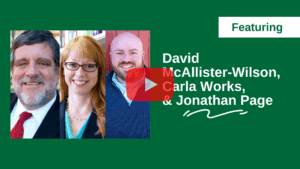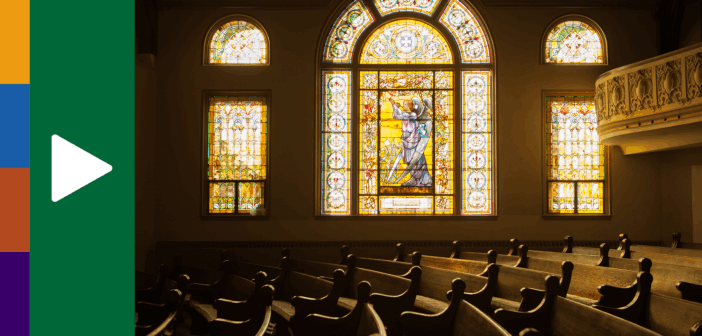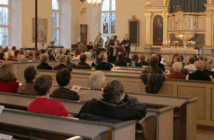
What does the future of church leadership look like? In this episode, new Lewis Center Director Jonathan Page joins Wesley Theological Seminary President David McAllister-Wilson and Dean Carla Works for an engaging conversation on leading with creativity, collaboration, and purpose. Together, they explore how the church can move beyond old models, embrace change, and follow the Spirit into new possibilities for ministry.
Listen on Apple Podcasts | YouTube Music | Spotify
Watch on YouTube

- Transcript — Click or Tap to Read
-
Announcer: Leading Ideas Talks is brought to you by the Lewis Center for Leadership of Wesley Theological Seminary in Washington, DC. Subscribe free to our weekly e-newsletter, Leading Ideas, at churchleadership.com/leadingideas.
Leading Ideas Talks is also brought to you by Discovering God’s Future for Your Church. This turnkey video tool kit helps your congregation discern and implement God’s vision for your church’s next faithful steps. Learn more and watch an introductory video at churchleadership.com/vision.
What does the future of church leadership look like? In this episode, new Lewis Center Director Jonathan Page joins Wesley Theological Seminary President David McAllister-Wilson and Dean Carla Works for an engaging conversation on leading with creativity, collaboration, and purpose. Together, they explore how the church can move beyond old models, embrace change, and follow the Spirit into new possibilities for ministry.
Jonathan Page: Well, hey there. Welcome to another episode of Leading Ideas Talks. And I’m saying welcome to another; this is my first. My name’s Jonathan Page. I’m the new director of the Lewis Center for Church Leadership at Wesley Theological Seminary. And today, I am hosting and the guest all at once. We’re doing a podcast today to introduce me, and we thought it’d be a great idea to have two great leaders from Wesley to be a part of this. And so, we’re gonna actually just have a conversation together about church leadership, a little bit about me, a little bit about each other. But it’s my pleasure to welcome President David McAllister Wilson and Dean Carla Works from Wesley Theological Seminary, and they are gonna join us as we engage in this conversation today. So, welcome y’all.
David McAlister-Wilson: Thank you. Good to talk with you.
Jonathan Page: Yeah. It’s good to, it’s good to be here at Wesley. Thank you all for your welcome to me, and before we talk about me, I’d really like to talk to the two of you. You are leaders in theological education and living in this seminary environment. I wonder how you might describe, from your seats, the state of church leadership today. And maybe Carla, I’d start with you as the Dean, just kind of from your perspective, what do you see emerging in church leadership from a seminary group?
Carla Works: Sure. That’s a great question, because the church is changing and seminary should be changing too. So, we’re seeing more and more, leaders in churches who may not be stopping everything in their lives to attend seminary or go get an M. Div. [Master of Divinity degree], are feeling God’s call. So, how can the seminary respond to the state in which we’re in? Wesley Seminary has been producing resources for a variety of different callings, including trying to equip those who feel called to ministry and maybe they’re going to be leaders of a parish; maybe they’re trying to be more faithful in light of, there are more and more bi-vocational ministers, and more people from the congregation are rising up into leadership roles. And so, seminaries should be the places where we fill this gap of needed education at a variety of levels, so that we’re actually fulfilling the needs of the church and helping all of those who are feeling called but do not feel equipped. And so, how can Wesley or other seminaries step into that role? I think it’s a needed role, and we are playing around and learning things as we go. But yet, it’s a lot of fun to think about how you’re fulfilling—at this particular time—the needs of the church.
Jonathan Page: That’s great. I love that. Carla, thank you for sharing that. David, how would you add onto that?
David McAlister-Wilson: I think I’d go back a ways to when I was in seminary, and when we were first talking about something that would become the Leadership Center. And in those days, if you used the word leadership, you were talking about a set of skills and insights that weren’t necessarily being taught in seminary.
Jonathan Page: Sure.
David McAlister-Wilson: And so, in those days, when I visited a pastor’s study, I’d see their seminary textbooks on one shelf, but the shelf that was at eye level, had a growing number of books on seminary administration and seminary leadership. And it was as if seminary education was good, but then, you needed some skills and insights that one called “practical” in order to help your church grow and thrive.
I think what’s changed, part of the change is because of Wesley and leadership. We established a leadership center as something critical to the task theological education itself. But for a long time, I think we had in mind that somehow, we were gonna help churches get back to where they once were.
Jonathan Page: Oh, interesting.
David McAlister-Wilson: Yeah. Back to where they were sometime in the vague period of the late fifties. “How do you fix this? How do you fix that?” You need more space for your nursery school. You needed your worship time at a different time. And the conventional wisdom then is that we would—that leadership involved getting back to where we once would want.
Now it’s more forward thinking, I think, and we’re seeking to be more thoughtful about what God would have us… what’s theological about church leadership. I liken our period to the flow of a river coming out of a high mountain, and as it gets down more to the flatland, a deep stream becomes a delta region, and you don’t know which one of those streams makes its way to the ocean. And I think we’re in that period now and necessarily.
Carla Works: I wonder if we could turn this question because Jonathan, you’re coming to this position from a space in judicatory leadership. So, what is your hope for church leadership as you step into this new role?
Jonathan Page: Well, so—to offer some context to that—I’m coming from … I’m a United Methodist by background and have served in a role that’s akin to a Director of Connectional Ministries, which is a position that’s codified within the United Methodist Book of Discipline. And what that position does in many ways is in its title; it’s about connecting people. And it, and really, I’m interested in this space with the Lewis Center to think about: “How are we connecting people to the resources they need,” but really, “How are we connecting people to one another?”
To me, that is the real emerging trend in church leadership that I see. And one of the things that’s a real space of importance for the Lewis Center, for Wesley, for all of us who are invested in this conversation is really to imagine “How are we laboring together for outcomes that we are feeling called by God to pursue?”
You know, I wrote in our, in my first article for Leading Ideas about the trend in the cinematic universe in the early part of this century was to have the individual superhero movie. And so, you’d have Spider-Man and Batman and Superman and Wonder Woman and all of these great characters who were these solo, heroic kind of figures. And then, after about a decade and a half, you started to see more and more groups of superheroes working on bigger issues together. So, you would see the Avengers, or Justice League, or Guardians of the Galaxy. And it’s not that everything that we do in the church is about being a superhero, but I think it’s an interesting analogy for where we’re headed as the church. Which is that the problems that we’re being asked to address, the ways that we’re being asked to live in the world, are a little bit bigger and more complex than we can handle independently. And so, the more that we can live in connection together and see our fellow leaders, not as competitors but as collaborators, I think there’s some real opportunity there. That does require us to sacrifice some of our former ways of doing things.
I think, I’ve read a lot of Ron Heifetz’s stuff over the years, and Jim Collins, and some of those great business-minded leaders, and there’s so much wisdom that’s there. But when we’re operating from a business-oriented perspective that is naturally competitive, it’s naturally about how there can be only one winner and everybody else is a loser. And I think part of the vision of the Kingdom of Heaven is that we all win when we’re together in the love of God.
And so, to me, I think there’s some real opportunity to lean in on that nature of collaboration and togetherness. But I don’t think that’s any one person’s responsibility. I think that’s gonna require shifts in our mentality amongst clergy, and it’s gonna require shifts in mentality amongst laity. Even in judicatories, when we think about—I don’t know how many pastors who are gonna listen to the … or lay people who will think about—the year-end statistics that you’re asked to gather. It’s a, there’s a lot of bean-counting that we do, and that’s really about: “Can I prove my worth to somebody who is employing me?”
And Carla, to your comment about bi-vocationalism, I think we’re gonna continue to see trends of folks who are doing ministry and other things, and what we really, I hope, will grow to value is how people are being transformed more than how many people are in a particular chair, or how many dollars are coming in. And so, that’s gonna require some evolution, too. And so, I think there’s a … there are a number of pieces that might end up lining up with some of those spaces for church leadership, and kind of bringing that from the judicatory space into the seminary space.
David McAlister-Wilson: And I think it might end up being, I think it really is a “both/and.” Sometimes the challenge in front of a pastoral leader is just how to do things well, and sometimes it’s how do we do the right things? And I see both issues in play simultaneously. So, we’re needing to be both managers and leaders in our spaces, asking, “what kind of problem is this? And what’s the right way to solve it?”
So, I’ve been really glad that you’ve come to the leadership center because, I think I told you my analogy—a great hardware store here in Washington: Strosniders.
Jonathan Page: Yeah.
David McAlister-Wilson: So, you go to the Strosniders Hardware store, and they have everything. More importantly, they have people in there who know where everything is, and know how to help you figure out—how to do what you need to do. I think if, what wouldn’t work is if we say, “Here’s the one thing that’s gonna lead the church revitalization.” Instead, we’re out there in a way exploring and sharing the things we’re finding to help us through this delta region.
Jonathan Page: And so much of that becomes more of a grassroots movement. It’s a bottom up, being able to say, “What are best practices? How are things emerging from within?” That maybe it’ll be applied in other settings rather than our trend historically [which]has been, “let’s do a top down here. Here’s what you have to do to ‘pass go and collect 200 dollars.’” And what I think we’re seeing in this adaptive challenge space is the way that we’ve always done things isn’t the way that we may do them moving forward.
And so often, I think, I was recently was working with a local congregation on a value space discernment exercise. And one of the things that struck me is distinguishing between our “core values” and our “accidental values.” So, core values are the things that are inherent to an organization no matter what. They will always be a part of your DNA and who you are. And your accidental values are the things that you do because you’ve always done them. And I think in a lot of the space of church leadership today is helping to really distinguish those two pieces. Because our activity can’t just be rooted in our tradition; it has to be rooted in our purpose. And that discernment for leaders is gonna be incredibly important in doing that, as you said, David, in ways that reflect a non-binary approach—that look at the multiplicity of outcomes.
Discovering God’s Future for Your Church is a turnkey tool kit to help your congregation discern and implement God’s vision for its future. The resource guides your church in discovering clues to your vision in your history and culture, your current congregational strengths and weaknesses, and the needs of your surrounding community. Learn more and watch an introductory video now.
David McAlister-Wilson: Carla I think behind me on my book of leadership, my list of leadership books, are books that say lead like Jesus or lead like Moses. I have not found that approach to the connection between leadership from the Bible to be the best way to think about this. What is the way that your discipline…?
Carla Works: Because I’m a Paul scholar by training. And so, confession, and don’t write-in asking about this, but I am writing a tongue-in-cheek reflection on leadership that I’m calling “Failing Like Paul.” Because if Paul were to write charge conference reports for his church, okay? We tend to think about Paul … put Paul on a pedestal. I mean, Paul has written so much of our New Testament. But these churches, they’re small. A dozen or more, And they’re famous for fighting. And so, you know, you would not necessarily, by our standards today, think that Paul was a smashing success. And yet, Paul’s ministry at seeing where God was at work in surprising ways led to groups of people who came together who had no place, no voice, really didn’t matter in their larger society—but they mattered in the church.
So, you talked earlier about coming together. Paul talks so much about the Body of Christ, and there’s so much power in those communities, and the Spirit is at work, but I don’t know that any of our church leadership material would actually point to some of Paul’s churches, if we could dissect them, and say, “That was a smashing success!” Instead, God worked—and God still works— in spite of us. I get to, as a Paul Scholar, reflect on, “Hmm. Maybe these leadership practices don’t look very successful, but what if that’s just the topsy-turvy Kingdom of God at work. That God takes what we think is really weak or ineffective and does something beyond any of our imaginations because that certainly happened with Paul’s churches.
Jonathan Page: That’s amazing. Yeah. And I think, if I can interject my own story into this, it’s when we started talking about me coming on as the Lewis Center Director—I think, in a conversation with you, David—I said, “Hey if you want just the well-known, the published, the fancy person. I’m probably not your guy, right? I don’t have… I’m not a published author. I don’t have a wide history of teaching seminary-level courses or anything like that. What I do have is a passion for the church and a passion for leadership.”
I was fortunate to study organizational change and leadership at the University of Southern California and get a Doctorate of Education in that. And a lot of that work in the dissertation is really looking at a problem of practice around the decline of recruitment of people of color to the clergy role in the United Methodist Church. And seeing the role of mentoring in that, it’s great to think about Paul. When I think about Paul as a leader, I think about Paul as a mentor to so many people … and just what creates legacy, and what creates outcome and that sort of thing.
And that’s a part of the “lean-in” in this season, of not only church leadership, but the Church. To be able to look in all places for where God’s people are showing up. Not only in buildings or in pews, not only in Sunday school classrooms, but being able to look in communities, being able to look to the margins, to see those different spaces.
I’m curious, especially for you, David, you’ve been the President of this school as, as long as the Lewis Center has existed. How have you seen just the evolution of, you spoke to this a little bit earlier, of church leadership, but really where do you see that moving forward from this place?
David McAlister-Wilson: I think one thing is a helpful lack of certainty about what should happen. Also, more of an examination of what the real cause and effect are that leads to congregational vitality. We focus too much on the, I think the lagging indicators rather than the leading indicators. Exactly. And I know in the work of getting new members, my wife Drema of McAlister-Wilson, who is fabulous at bringing new people to the church, and somebody asked what’s the key to it? One key was she was just rabid about going through those membership cards in the pews. I don’t even think those cards are in the pews now, but in those days they were. And she’d come home on a Sunday afternoon and go through the cards to find somebody who was new, check it against the membership rolls. You think, “Well that’s the key.” Yeah. The real key was that she just connected with people. That was the key.
Jonathan Page: Sure. Sure.
David McAlister-Wilson: But you also needed a way to keep track of that.
Jonathan Page: Sure.
David McAlister-Wilson. And I think there’s a growing awareness of the messiness; that there’s no single answer, and you look for what God is doing, and then work harder and work smarter.
Jonathan Page: Absolutely. I was… just had a conversation recently with Lovett Weems about this very… exactly what you’re describing, and what he said is, “You know, it’s one thing for a pastor to go to a person, and especially a younger person, and say, ‘why haven’t you become a member yet?’” And we’ll take, “Because I’m, I don’t wanna be a member of anything.”
But if you go and say, “Hey, I notice you are showing up for worship or you’re there to serve folks, you’re in a discipling space. What’s motivating you to do that? What’s at the core of who you are?” And then being able to create space for invitation that goes beyond sort of our categorical norms and seeks to meet people where they are. There’s some real wisdom in that, I think, just in … in how we are training and educating future leaders. Not to, you know, my wife’s a schoolteacher, and she will talk often about having to meet standards of learning or things that are assigned—again, that top down, “This is how you will know you have learned the subject matter.” And sometimes that is true. And other times we find the way people learn is a little bit different. And I think the same’s true for how we come to faith and what we see in the church. And I imagine that’s part of what we see in the student body here at Wesley, Carla.
Carla Works: It’s a journey…
Jonathan Page: Right.
Carla Works: So, I would like to think about what your priorities might be moving forward. We’ve talked about connectivity and helping folks think more in a team mindset.
Jonathan Page: Sure.
Carla Works: I wonder know, you can only do so much. What would be your priorities moving forward?
Jonathan Page: Sure. So, I think right off the bat, a couple things. You know, from the moment I found out I was gonna have this opportunity, what I’ve grown to understand is that the Lewis Center is really known for delivering strategic, actionable insights to leaders, to congregations, to communities throughout the world. And so, continuing to find ways to deliver strategic actionable insights is a really important priority. I think this space is one of those, one of those pieces, making sure that our Leading Ideas newsletter, our Leading Ideas Talks podcasts, reflect the cutting edge of where we are in church leadership and have a frequency and consistency and reliability to offer those deliverables. And figuring out ways that we can do that maybe in other forms as well. We’re living into a space where our consumption of media is various, and so I’m excited to imagine the ways that, that the Lewis Center will be partnering with the seminary on things like, for example, our Pathways program and some of the other deliverables that we have to make sure that people are equipped with resources they need to lead well. That to me is the number one priority.
I think some areas of interest related to that work, Carla, you know, we talked loosely about how is it that we measure vitality in churches. This is a little bit of the work that I’ve been doing in my current role—or my sort of current role in the judicatory space—is thinking about metrics and measurements that can better reflect what vitality looks like in church today. I love what you said, David, about the leading measures versus lagging measures. I think another way of saying that idea is moving from transactional sorts of measurements to transformational forms of measurements. And so how could we at the Lewis Center be a part of helping to shape that conversation around what that can look like? And that’s happened for me within the United Methodist family. But I imagine that churches of all different sorts are really interested in thinking about this.
I’m really interested to think about my experience of what we’ve defined as church leadership excellence, especially in the last 20 years, has been relatively anglo-centric. I’m really interested to, to inquire upon how we can look to a wide variety of traditions and perspectives to understand church leadership from a wide variety of lenses. Because I think so much of church leadership is intersectional. It’s about the intersections of different positionalities we hold, like race, and gender orientation, socioeconomic status, political perspective, educational background. And the truth is, like we’ve talked about already—Carla, that you highlighted so well: The church is often led by the least expected folks. And so, how can we look outside of what our normative lenses have been to really see the possibilities of church leadership?
And then the last thing I would say is that idea of community-based leadership. That the connection that we live into in leadership is not only within the church, but it’s within community partnerships as well. And so, how do we foster and form community-based leadership principles and partnerships that still hold to the value of the Christian tradition, and still hold to the value of the unique nature of the church, but are intentionally lived out in a wider and broader capacity, both as a mercy and justice kind of tool, but also as an evangelistic tool; to say there, there are plenty of voices in the world today who offer a lens of what it means to be a Christian.
And so, I think that’s a part of being a witness as a leader is being able to model a form of Christian leadership that is more in line with the gospel, and more in line of the life and ministry of Jesus. And so, the more that we could be pushing towards that the better.
Carla Works: Sounds very “Pauline” as well.
Jonathan Page: Maybe! Does that mean I might fit in the seminary? That would be good! Everything sounds Pauline to Carla. Haha
Carla Works: Well, not everything.
Jonathan Page: Not every—but a lot of things. Well, this all has sounded really great to just be able to be in conversation together and have a few minutes. And I wanna thank all of you, who have been willing to give of your time to, to check out this podcast.
And I wanna let you know that there are more resources for you as a leader at churchleadership.com. I’d invite you to visit that website to find Leading Ideas, resources, more of these podcasts, and other ways that you can connect and be involved.
And I’d also encourage you to check out wesleyseminary.edu. There are a wonderful number of resources through the seminary that are there for your engagement and use. And maybe this is a part of a nudge to, to you being called to something deeper, something engaging theological education. And we’d love to be in that conversation with you at Wesley Theological Seminary.
As always, anytime I have a conversation with a person or group of people, I like to say: “Do you have a last word or phrase that you wanna leave people with?” So, let me ask that of the two of you, any last word or phrase that you want leave people with?
Carla Works: I would say God is still doing a lot of new things and you will be surprised by where you see the Spirit on the loose. So, follow that Spirit wherever it leads.
David McAlister-Wilson: And I’d say rather than us thinking about how are we gonna turn the church around?—A little tired of that phrase. We’re not gonna turn the church around. We’re gonna turn it towards the future, and I invite you all, not just to be consumers of the leadership center, but contributors too to what we’re trying to do at this institution.
Jonathan Page: Amen. That is a good way for us to end. So, thank you so much, friends. Enjoy the day and we’ll look forward to getting with you again soon through the Leading Ideas podcast or through the Leading Ideas newsletter and the work of Wesley Theological Seminary. Enjoy the day.
Announcer: Thank you for joining us for Leading Ideas Talks.
Don’t forget to subscribe to our free weekly e-newsletter, Leading Ideas, to be notified when new episodes are published. Visit churchleadership.com/leadingideas.
Related Resources
- 5 Ways to Develop New Leaders by Marv Nelson
- 7 Mindset Shifts that can Reshape Your Church’s Future by Lia McIntosh, Jasmine Smothers and Rodney Smothers
- Who Will be God’s Agents of Pastoral Calling by Lewis Center
If you would like to share this article in your newsletter or other publication, please review our reprint guidelines.





